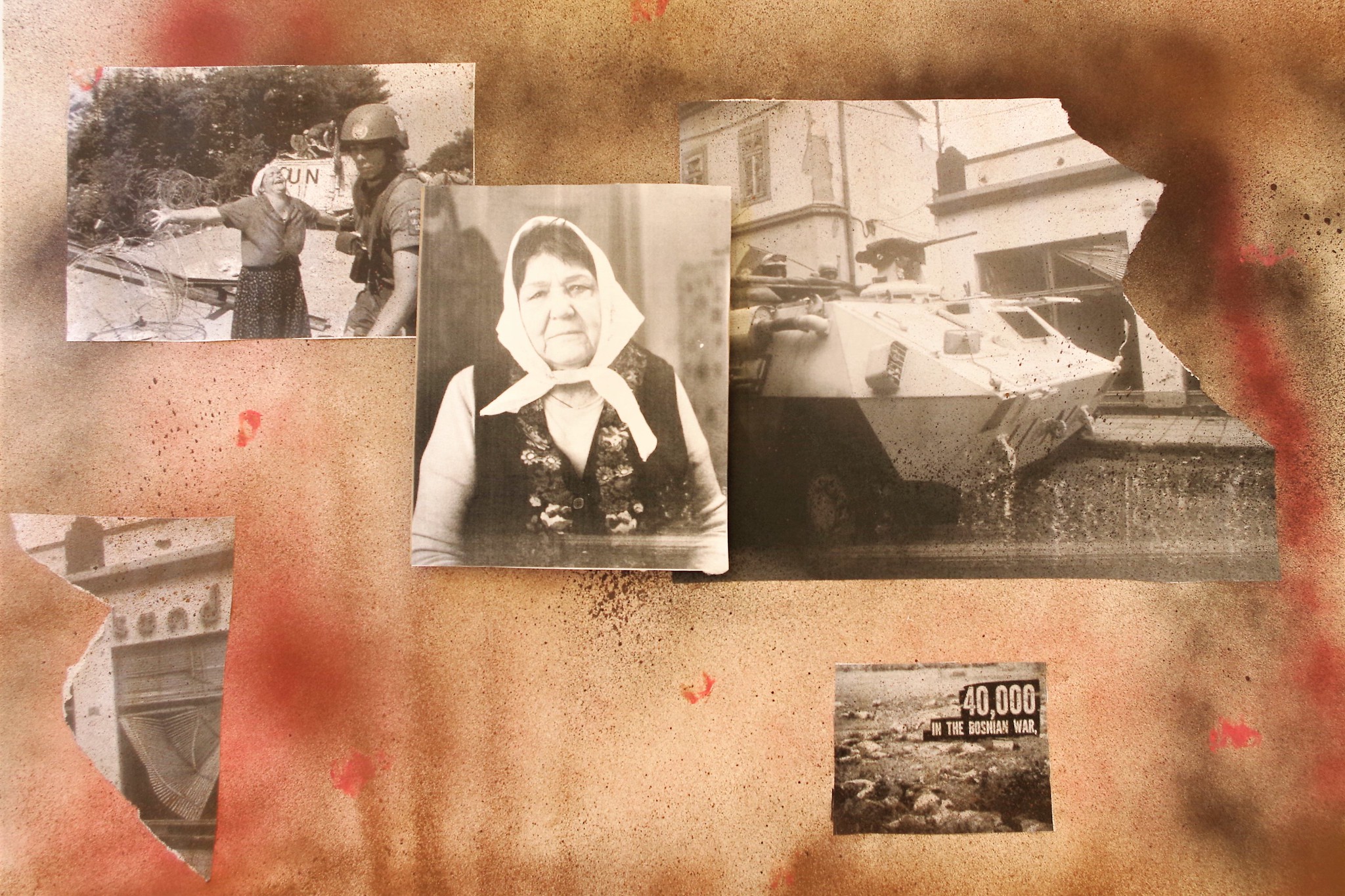
“Balkanization” is a term that does not need much explanation today. It has dominantly, although not exclusively, become a shorthand in global political, cultural, social, artistic, and other circles for describing the violent process of the disintegration of sociopolitical entities such as the state, federation, union, nation, community, social identity, etc.[1] Meanwhile, Yugoslavia—which, during the nineties, became known for bloody disintegration through ethnic cleansing and genocide—has become a synonym for the Balkans as a whole within this framework. While I do not want to exclude the common definition of the term, this essay aims to shed light on an alternative perspective that delves deeper into the historical complexities of the region. Divorced from its geographical context, the concept has become synonymous with socially regressive policies along with ethnic, nationalist, religious, and other forms of fundamentalism. Contrary to the views held by many political, cultural, and social figures and theorists, divisive violence is not an exclusive characteristic of the Balkans or the former Yugoslav areas but is a feature of the modern European and global political history of nationalism in which this region is deeply immersed.
Nationalism is not an ancient trait of the European Southeast. Rather, it is a classic Western European product, which, until the first decades of the 20th century, was generally a marginal phenomenon in the Balkan region. It only became prominent when it was imported into the region. Wars fought around issues of nationalism were common in Western Europe during the 20th century. Further, there were instances of significant violence and turmoil. Events such as World War I, the Spanish Civil War, and World War II significantly shaped the continent’s political landscape before the Balkan conflicts gained momentum. While the Balkans indeed experienced “total war” from both historical and political perspectives, such a concept was not sui generis to the region, and indeed European regimes and systems prior to the Yugoslav case were the first to engage in it. This also extends to mass persecution and displacement of populations, a practice that was characteristic of countries in Europe long before the conflict in the Balkans, notably in Yugoslavia, where it escalated. This is evident not only in the world wars but also in events like the expulsion of Jews from today’s Spanish territory during the 15th and 16th centuries or in the repercussions of the Nazi concept of Lebensraum (“living space”). Similarly, in the broader discourse around “balkanization,” ethnic cleansing also emerges as a defining feature of the Yugoslav conflict despite the origins of the practice in the Austro-Hungarian monarchy’s ethnic cleansing of the Muslim-Ottoman populations in the 19th century. The rise of modern nationalism in the 19th and 20th centuries saw a proliferation of such policies across Europe. There is evidence of this in events like the genocide against Armenians and the atrocities of the Holocaust perpetrated by the Third Reich. Additionally, the ethnic cleansing and genocidal targeting of Indigenous populations in Africa, Asia, Australia, and the Americas by European empires since the 15th century further underscores the “non-Balkan” brutality inherent in these practices. Namely, ethnic, national, and religious wars are not solely confined to the 1990s in the Balkans and Yugoslavia, for such conflicts had occurred around the world long before the mentioned period, e.g., the Lebanese Civil War (1975–1990), the Nigerian Civil War (1967–1970), the conflict in Burma following independence from British rule in 1948, the India-Pakistan war over Kashmir immediately after the partition of India in 1947, the Rwandan genocide (1990–1994), and the like.
Nationalism is not an ancient trait of the European Southeast. Rather, it is a classic Western European product, which, until the first decades of the 20th century, was generally a marginal phenomenon in the Balkan region.
Likewise, it’s also essential to consider the aspect of glorifying war as a form of martyrdom and the associated pursuit of revenge against perceived others, for this phenomenon also transcends the Balkans, resonating across numerous cultures and peoples worldwide in the modern era. Many cultures have elevated the sacrifice of one’s life for the sake of their ethnic, national, religious, or cultural community by shedding the blood of others in the context of nationalism, e.g., Japan in World War II, the fight against French colonialism in Algeria (1954–1962), the mujahideen’s resistance against the Soviet invasion in Afghanistan in the 1980s, or the Irish War of Independence (1919–1921). Certainly, one should not disregard from this list religion’s influence on shaping and understanding the social and political landscape within a certain state, which also extends beyond the Balkans area. Religion played a pivotal role in numerous conflicts and political transformations globally ahead of the Yugoslav conflict. This can be seen in the Indo-Pakistani war, the Northern Ireland conflict of the latter half of the 20th century, the enduring Israeli-Palestinian conflict, and others. Lastly, there is the practice of inventing ethnic and national roots to confer greater historical legitimacy upon one’s own people, a tactic employed by many European peoples before it began to unfold in the Balkans. Moreover, nearly all European nations in the 19th century sought their ancestry and origins in the early Middle Ages to validate their national identities, drawing parallels with various groups of barbarian peoples who established settlements and kingdoms upon the remnants of the Western Roman Empire.
Therefore, even though nationalism and war, labeled under the term “balkanization,” are associated with Yugoslavia, similar issues are evident in other parts of Europe and the world. This suggests that there is no unique sequence of events in the Balkans but rather a continuous thread of European and global sociopolitical movements. The parallel between balkanization and Yugoslavia more likely stems from the timing of the last Yugoslav conflict, which occurred during an era when many believed that the fall of the Eastern Communist bloc had ushered in a pro-Western liberal-democratic era. There was a widespread belief that humanity was transitioning into a new post-historical age and that the war in Yugoslavia was the final remnant of an old historical epoch. Yet, this perception was soon proven to be a delusion, as the violent disintegration of Yugoslavia, amid ethnic and religious conflicts worldwide, rather than concluding an era, became a precursor to the tumultuous one that followed. Therefore, it is increasingly important to explore the roots of “balkanization” beyond simplistic explanations centered solely on the dissolution of the Yugoslav Federation.
Even though nationalism and war, labeled under the term “balkanization,” are associated with Yugoslavia, similar issues are evident in other parts of Europe and the world.
It’s crucial to uncover the obscured or overlooked aspects of this narrative in order to reveal Yugoslavia’s capacity to cultivate a sociopolitical framework capable of serving, figuratively, as a constructive bridge between the “Western” and “Eastern” ideologies, reflected primarily in social security, health security, free education for all citizens, inter-religious cooperation, mixed marriages, antifascists traditions, secularism, and other similar ideas. In this regard, I would go so far as to characterize Yugoslavia as the pinnacle of civilization in the Western Balkans, epitomizing the culmination of diverse cultural, political, and social influences that coalesced to create a distinct and vibrant society. This designation encapsulates its profound impact on the region’s history, evident in its nurturing of cultural diversity, geopolitical relevance, pioneering political structures, and notable advancements in gender equality, social welfare, worker empowerment, literacy, and other areas of social progress. Despite its evident flaws, Yugoslavia retained values worth pursuing and refining. A comparison between the era preceding and following the existence of the Socialist Federal Republic of Yugoslavia underscores the undeniable truth of this assertion. Essentially, Yugoslavia embodied a framework for advancement and collaboration that seems unachievable in the current fragmented landscape of post-Yugoslav states. Paradoxically, while these aforementioned values are deeply ingrained in Balkan, especially Yugoslav, heritage, they are often overshadowed by the label of “balkanization,” which tends to focus on activities aimed at undermining humanistic ideals such as pluralism, secularism, social justice, and equality.
The communist regime of Yugoslavia, often misunderstood as solely authoritarian, actually embodied elements of a social state. This is a common oversight among scholars and politicians who sometimes forget that Yugoslavia stood apart from the Iron Curtain sphere. Despite the authoritarian nature of President Josip Tito’s regime, it played a pivotal role in the Non-Aligned Movement; in supporting people in the Third World states in their anti-colonial movements for national independence; and, from 1950 to 1975, in building two million apartments for workers, offered at symbolic rents. However, all of this can be easily found in history books. Thus, I would like to highlight some points that speak convincingly about humanistic values in Yugoslavia and the Balkans, which I hope fosters a social feeling and sense that is not often documented. Namely, the Yugoslav regime provided education for the children of impoverished and uneducated families, enabling, for instance, their offspring to become engineers in prestigious companies within the state, and beyond it. It exemplified a societal ethos wherein the surgeon who operated on the president was the same individual who treated a wounded laborer. The Catholic church, the Orthodox church, the mosque, and the synagogue were practically located on the same street almost wherever these communities gathered in one place, etc. However, these aspects often remain overshadowed or unrecognized in discussions about the Balkans, i.e., Yugoslavia, despite their integral role in shaping its identity. So, if you ever wish to delve deeper into the topic of “balkanization,” don’t hesitate to ask, as the Balkans embody not just a collection of negative sociopolitical outcomes but also an extensive unexplored territory, fostering numerous social initiatives and a social consciousness that, as evident from global social and political movements, could be invaluable in shaping the future of human society.
[1] Some of the academics who resist portraying the Balkans solely through a negative lens and whose research is valuable in this context are Slavoj Žižek, Boris Buden, Žarko Paić, Siniša Malešević, Slavica Jakelić, Ksenija Vidmar Horvat, Vjekoslav Perica, Mitja Velikonja, Paul Mojzes, Rastko Močnik, Srđan Vrcan, and the like.

